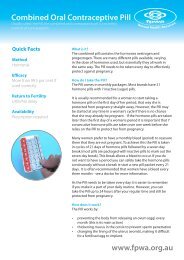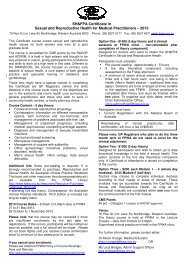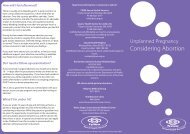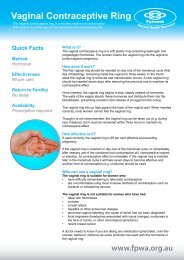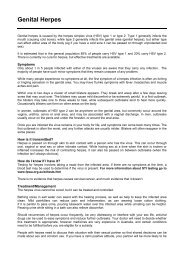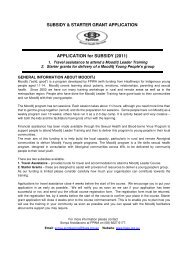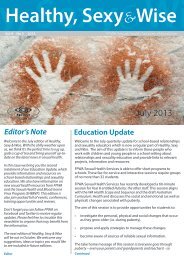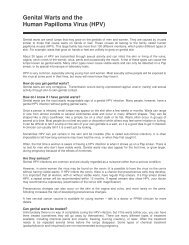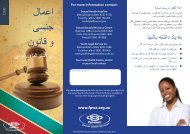Report - FPWA Sexual Health Services
Report - FPWA Sexual Health Services
Report - FPWA Sexual Health Services
Create successful ePaper yourself
Turn your PDF publications into a flip-book with our unique Google optimized e-Paper software.
Annual<br />
<strong>Report</strong> 2011<br />
<strong>FPWA</strong> <strong>Sexual</strong> <strong>Health</strong> <strong>Services</strong><br />
<strong>Sexual</strong> <strong>Health</strong> <strong>Services</strong><br />
1
ACKNOWLEDGMENTS<br />
“ ”<br />
<strong>FPWA</strong> <strong>Sexual</strong> <strong>Health</strong> <strong>Services</strong> wishes to thank<br />
the following people and organisations for their<br />
support and financial assistance during 2010/11<br />
Department of <strong>Health</strong> WA -<br />
<strong>Sexual</strong> <strong>Health</strong> and Blood-borne Virus Program<br />
Department of <strong>Health</strong> WA –<br />
Women and Newborn <strong>Health</strong> Service<br />
Disability <strong>Services</strong> Commission<br />
Office for Aboriginal and Torres Strait Islander <strong>Health</strong><br />
Ansell International<br />
<strong>FPWA</strong> BOARD<br />
President<br />
Marilyn Clark-Murphy PhD, Master of Business (Economics<br />
and Finance), Grad Cert Tertiary Education, BA<br />
Vice President<br />
Margaret Pyrchla BBus, Grad Dip Account, Master of<br />
Applied Finance and Investment, Grad Dip Applied Corp<br />
Governance<br />
Treasurer<br />
Estelle Dawes BCom<br />
2<br />
Jenny Cramer RN, RM, Dip Community <strong>Health</strong> Nursing,<br />
Dip Tropical Public <strong>Health</strong>, Master Nursing Administration,<br />
PhD (Nursing)<br />
Madeleine King BLaws<br />
Irena Morris BSc Mgt Information, MBA<br />
Jeffrey Indich Cert 3 and 4 Aboriginal/Torres Strait Islander<br />
Primary <strong>Health</strong> Care<br />
Mandy Stringer Dip Adult Education<br />
Youth Member<br />
Devan Moorthy<br />
Staff Representative<br />
Clare O’Leary BEducation, Dip Teaching (Primary)<br />
EX OFFICIO <strong>FPWA</strong> MANAGEMENT STAFF<br />
Chief Executive Officer<br />
Stephen Blackwell, RMHN, RN, B.Appl.Sci (Nursing), Grad<br />
Dip Arts (Counselling), Post Grad Dip (Social Research and<br />
Evaluation), MHRM<br />
Director Corporate <strong>Services</strong><br />
Jean McGibbon, BBus, CPA<br />
Life Members<br />
Mr Roy Claughton<br />
Dr Carol Deller<br />
Mr Jim Palmer<br />
Dr Myrna Tonkinson<br />
ANNUAL REPORT<br />
Edited by Rebecca Smith<br />
Design by Jessica Predovnik
CONTENTS<br />
“ ”<br />
To provide leadership in sexual and<br />
reproductive health throughout WA<br />
— Mission Statement<br />
4 President’s <strong>Report</strong><br />
5 CEO’s <strong>Report</strong><br />
7 How <strong>FPWA</strong> is working with priority populations<br />
9 Rural <strong>Services</strong><br />
11 Northbridge Clinical <strong>Services</strong><br />
15 Education and Training <strong>Services</strong><br />
21 Magenta and SWOPWA<br />
24 People 1st Programme<br />
28 Information <strong>Services</strong><br />
32 Quarry <strong>Health</strong> Centre<br />
35 Roe Street Centre for Human Relationships<br />
39 Financial Statements<br />
51 Staff List<br />
3
PRESIDENT’S REPORT<br />
As <strong>FPWA</strong> moves into the third and final year of its current<br />
strategic plan, it is appropriate that this year’s Annual <strong>Report</strong><br />
looks at the ways in which the organisation remains focused<br />
on pursuing key strategic goals, as well as working with<br />
priority populations. A review of the report shows that the<br />
hard work of staff is a key component in positioning <strong>FPWA</strong><br />
to respond to and serve the community’s needs, and I would<br />
like to commend all staff for their ongoing commitment to<br />
the provision of such excellent services.<br />
While the Annual <strong>Report</strong> demonstrates the many ways <strong>FPWA</strong><br />
continues as a leader in the development and provision of<br />
4<br />
DR MARILYN CLARK-MURPHY<br />
<strong>FPWA</strong> PRESIDENT<br />
sexual and reproductive health services across WA, my report<br />
will concentrate on <strong>FPWA</strong>’s involvement in efforts to promote<br />
sexual health at a national level.<br />
<strong>FPWA</strong> has been a member of <strong>Sexual</strong> <strong>Health</strong> and Family<br />
Planning Australia (SH&FPA) since 1974. SH&FPA’s goal is to<br />
promote and advocate for sexual health and sexual rights<br />
both in Australia and overseas. I continue to represent <strong>FPWA</strong><br />
as a member of the SH&FPA Council, currently serving as<br />
Vice-President, while <strong>FPWA</strong>’s CEO is part of the SH&FPA<br />
National CEOs Forum.<br />
As well as giving the organisation a strong national voice,<br />
one of the main benefits <strong>FPWA</strong> derives from its SH&FPA<br />
membership is the opportunity for key staff to network<br />
with their counterparts in other States. The professional<br />
groups of SH&FPA include the CEOs Forum, Senior Medical<br />
Officers, Nurses and Education Managers. These networks<br />
allow member organisations to liaise with one other, share<br />
resources and work on projects collaboratively. Any project<br />
that involves three or more member organisations has been<br />
identified as one that should come under the umbrella of<br />
SH&FPA.<br />
In early 2011 SH&FPA signed a new three-year funding<br />
agreement with the Federal Government. This agreement<br />
includes a significant increase in SH&FPA’s annual funding,<br />
and will put the organisation on a sound financial footing<br />
to expand its operations. The contract focuses on four key<br />
components that SH&FPA, with input from its members<br />
organisations, will co-ordinate: to strengthen and expand<br />
sectorial and cross-sectorial national networks in the area of<br />
sexual and reproductive health; improve access and equality<br />
for Aboriginal and Torres Strait Islander People in sexual and<br />
reproductive health care and health promotion; strengthen<br />
and increase workforce capacity in sexual and reproductive<br />
health; and assist in bridging the gap between research<br />
findings, service delivery and appropriate development<br />
of national policy and program activity in sexual and<br />
reproductive health.<br />
SH&FPA’s international program currently focuses on southeast<br />
Asia and the Pacific. Historically SH&FPA has delivered<br />
sexual health programmes in various locations, including<br />
Papua New Guinea and the Solomon Islands, with these<br />
programmes funded primarily by AusAid. However, the<br />
SH&FPA Council recently decided that, as in the national<br />
arena, progamme delivery should be the province of State<br />
organisations. SH&FPA will therefore be moving out of its<br />
current delivery contracts when they expire next year to<br />
focus on promotion and advocacy. This will give SH&FPA<br />
a more consistent role and voice in both the national and<br />
international arenas.<br />
Finally, I would like to personally thank Board members<br />
for their continued support and commitment to <strong>FPWA</strong>,<br />
and I look forward to working with our funding agencies,<br />
managers, staff and other stakeholders over the coming year.<br />
Dr Marilyn Clark-Murphy<br />
President
CEO’S REPORT<br />
STEPHEN BLACKWELL<br />
<strong>FPWA</strong> CEO<br />
Welcome to <strong>FPWA</strong>’s Annual <strong>Report</strong> for 2010/11. It gives me<br />
great pride to reflect on the work of this vibrant organisation<br />
over the last 12 months. As we near the end of our current<br />
strategic plan, this year’s report provides an update on work<br />
completed towards the five goals of the Strategic Plan for<br />
2009/12:<br />
Developing strategic alliances for affective<br />
service delivery<br />
<strong>FPWA</strong> continues to identify strategic alliances that<br />
enhance sexual and reproductive health services offered<br />
to Western Australians. It is acknowledged that <strong>FPWA</strong> is<br />
not able to provide direct service delivery to everyone in<br />
the State, however our ongoing relationships with tertiary<br />
institutions ensures that most health professionals receive<br />
undergraduate and post-graduate training in sexual and<br />
reproductive health. The organisation is currently revising<br />
how it provides support and training to teachers to ensure<br />
that they have the skills and knowledge to provide sexual<br />
and reproductive health education in schools. The outcome<br />
of this strategy shift will see school students in Western<br />
Australia provided with a comprehensive, age-appropriate<br />
sexual and reproductive health curriculum, resulting<br />
in improvements in their sexual health knowledge and<br />
accompanying decision-making.<br />
of <strong>FPWA</strong>’s iconic programs, Mooditj and PASH, continue to<br />
be viewed as “must do” programs for community members/<br />
peer educators who want to undertake sexuality education<br />
in their communities.<br />
<strong>FPWA</strong> continues to work with community organisations<br />
such as Midland Women’s <strong>Health</strong> Care Place, South Coastal<br />
Women’s <strong>Health</strong> <strong>Services</strong> and Divisions of General Practice.<br />
This model will be modified in the near future to ensure that<br />
when <strong>FPWA</strong> provides clinical or other services, it will only do<br />
so if building the capacity of our partner is a major outcome<br />
of the collaboration.<br />
Constantly apply evaluation mechanisms across all<br />
services<br />
<strong>FPWA</strong> undertook significant evaluations of its Aboriginal<br />
Educator and Magenta projects during 2010/11. Results<br />
from these evaluations were not available at the time of<br />
reporting, however it is anticipated that the outcomes will<br />
assist <strong>FPWA</strong> to modify these projects to better achieve their<br />
identified outcomes. All new projects now have evaluation<br />
built into their proposals and budget, and staff recognise<br />
that program evaluation is essential quality improvement.<br />
Have a clear research focus<br />
5<br />
Community education, especially for Aboriginal Western<br />
Australians and young people, has benefitted greatly from<br />
<strong>FPWA</strong>’s capacity building of community members to deliver<br />
best practice sexual and reproductive health education. Two<br />
In late 2009 <strong>FPWA</strong> employed a part-time Research<br />
Coordinator for the first time. A Research Committee was<br />
also convened to assist in establishing a research agenda
for the organisation. The committee meets monthly and<br />
has been instrumental in assisting the co-ordinator to<br />
identify research opportunities, possible research partners<br />
and funding streams. The projects that are currently being<br />
developed include investigating the sexual and reproductive<br />
health knowledge and health-seeking behaviour of<br />
international students studying at universities in Western<br />
Australia, and identifying the sexual health knowledge and<br />
behaviours of older Western Australians. A research proposal<br />
has been completed for first project, and one is currently<br />
being drafted for the second.<br />
Forming strategic alliances with other research-oriented<br />
institutions is proving more problematic, with competition<br />
for research dollars high and research institutions not keen<br />
to share their funding sources, in addition to being busy with<br />
their own existing research activity. <strong>FPWA</strong> continues to have<br />
discussions with Curtin and Edith Cowan Universities, Family<br />
Planning New South Wales and Shine SA to discuss possible<br />
research partnerships in the future.<br />
Become an employer of choice<br />
<strong>FPWA</strong> has always strived to be an employer of choice. The<br />
need for this originates in the fact that <strong>FPWA</strong> is a not-forprofit,<br />
non-government organisation. Historically, funding<br />
for these types of organisations results in staff wages<br />
that are not commensurate with the public sector - to<br />
compensate, NGOs tend to be more inclusive, consultative<br />
and family-friendly, which is certainly the case for <strong>FPWA</strong>.<br />
The organisation also encourages and assists in payment for<br />
continuing professional development.<br />
These strategies, although not always useful in attracting<br />
new staff, especially in the boom economy of Western<br />
Australia, are usually effective in retaining existing staff. An<br />
added bonus to these strategies is the recent announcement<br />
by the Western Australian Government that base funding<br />
to the third sector in Western Australia will increase by 15%<br />
from 1 July 2011. This government initiative, plus existing<br />
interventions identified in the current strategic plan, should<br />
result in <strong>FPWA</strong> becoming an employer of choice.<br />
Identify and document intellectual capital and<br />
knowledge<br />
This goal is progressing slowly, with a major impediment<br />
to achievement being the lack of recognized best practice<br />
standards within the organisation. <strong>FPWA</strong> has commenced<br />
a literature review of best practice standards, and once<br />
this review is finalized, will identify the best process for<br />
the organisation. It is anticipated that by the end of 2012,<br />
<strong>FPWA</strong> will have implemented best practice standards for<br />
documentation and version control across the agency.<br />
I look forward to continuing to work with staff over the<br />
coming year towards attainment of these strategic goals.<br />
Steve Blackwell<br />
CEO<br />
6
HOW <strong>FPWA</strong> IS WORKING WITH PRIORITY POPULATIONS<br />
1. 2. 3.<br />
Young people Aboriginal people People with disabilities<br />
• Dedicated safe and supportive space at Quarry<br />
• Discounted service fees<br />
• Holding interactive stalls at community events<br />
and school health expos<br />
• Social media<br />
• Working in partnership with youth-focussed<br />
organisations<br />
• Regular programs delivered for young people in<br />
detention<br />
• Nuts and Bolts of <strong>Sexual</strong> <strong>Health</strong> training program<br />
provides core sexual health knowledge and skills<br />
for people to support and educate young people<br />
around sexual health issues<br />
• Commitment to working in culturally secure<br />
manner, with meaningful participation of<br />
Aboriginal individuals and communities<br />
• Mooditj program for Aboriginal young people<br />
and Mooditj Leader Training<br />
• Nuts and Bolts of <strong>Sexual</strong> <strong>Health</strong> training<br />
program designed to be appropriate for<br />
Aboriginal service providers<br />
• Specific purpose of Pilbara and SAPP projects<br />
is building the capacity of the rural and remote<br />
workforce to promote sexual health, with a<br />
focus on Aboriginal sexual health<br />
• Working with and targeting culturally specific<br />
services in order to create new and appropriate<br />
links and referral pathways<br />
• Participation in NAIDOC week<br />
• Dedicated disability project<br />
• Development of basic condom pack and<br />
brochure about condom use with realistic<br />
illustrations targeted for use by disability<br />
organisations and schools<br />
• Community sessions allowing members to<br />
practice interpersonal and social skills through<br />
friendship group ‘The Meeting Place’<br />
• Purchase of disability beds for Northbridge<br />
Clinic<br />
7
4. 5. 6.<br />
CaLD people Sex industry workers Rural and remote communities<br />
• Development of new multicultural sexual health<br />
resources in a variety of languages<br />
• Interpreters available for telephone or face-toface<br />
appointments<br />
• Employment of a CaLD educator at Magenta to<br />
establish contact with CaLD groups<br />
• Development of translated resources covering<br />
STI information and health and safety work<br />
practices for distribution to Magenta clients<br />
• Increasing translated materials available on<br />
Magenta’s website<br />
• Targeting local organisations who work directly<br />
with CaLD communities to promote <strong>FPWA</strong><br />
services<br />
• Providing sessions covering issues such as<br />
safe sex, STIs, contraception, risky behaviour,<br />
pregnancy, relationships and negotiating<br />
consent<br />
• Participation in Harmony Week<br />
• Development of new CaLD section on <strong>FPWA</strong>’s<br />
website<br />
• Two projects dedicated to health and safety<br />
of sex workers<br />
• Weekly sexual health clinic for sex workers<br />
• Ensuring information/resources are available<br />
online<br />
• Providing library and National Condom Day<br />
resources free of charge<br />
• Regularly visiting regional areas where demand<br />
for sex work is high and providing health and<br />
safety information<br />
• Specific purpose of Pilbara and SAPP projects<br />
is building the capacity of the rural and remote<br />
workforce to promote sexual health<br />
• Delivering training programs to the regions<br />
• Providing subsidies for rural and remote workers<br />
to attend Perth training<br />
• Social media<br />
• Using creative service delivery methods to<br />
accommodate people travelling to Perth for<br />
sessions<br />
• Telephone counselling<br />
8
RURAL SERVICES<br />
9
NORTHBRIDGE<br />
CLINICAL SERVICES<br />
“ ”<br />
<strong>FPWA</strong> <strong>Sexual</strong> <strong>Health</strong> <strong>Services</strong> provides clinical services to<br />
both men and women of all ages.<br />
11
NORTHBRIDGE CLINICAL SERVICES<br />
12<br />
<strong>FPWA</strong> continued to offer clinical consultations<br />
on a wide range of sexual health issues for<br />
both men and women, as well as providing<br />
professional development for general<br />
practitioners and nurses wanting to update<br />
their skills and knowledge in the areas of<br />
sexuality and sexual health. Due to popular<br />
demand, clinics on Thursday evenings and<br />
Saturday mornings continued to run, offering<br />
a wide range of appointment times for clients.<br />
Run by Northbridge Clinical <strong>Services</strong>, the <strong>Sexual</strong><br />
<strong>Health</strong> Helpline (SHH) is a confidential telephone<br />
information service staffed by Advanced Practice<br />
Nurses (APNs). The service is funded by the<br />
Department of <strong>Health</strong> WA’s <strong>Sexual</strong> <strong>Health</strong> and<br />
Blood-borne Virus Program, and is accessed by<br />
health professionals and community members via<br />
phone and email.<br />
Develop strategic alliances for effective<br />
service delivery<br />
Northbridge Clinical <strong>Services</strong> remained a<br />
part of the PAP Smear Credentialing Advisory<br />
Committee, and continued to nurture partnerships<br />
with tertiary educational institutions. Working<br />
relationships were maintained with three private<br />
termination clinics (Marie Stopes International,<br />
Nanyara Pregnancy and Termination Clinic, and<br />
The Women’s Clinic), and alliances between<br />
specialist outpatient clinics at major hospitals were<br />
strengthened.<br />
Clinic facilities continued to be leased to private<br />
medical practitioners running colposcopy and<br />
Implanon clinics, ensuring that <strong>FPWA</strong> clients<br />
were able to access to these services in a timely<br />
manner. <strong>FPWA</strong> continued to provide Midland<br />
Women’s <strong>Health</strong> Care Place with APN support<br />
to run its Well Women’s Clinic, and a successful<br />
collaboration between <strong>FPWA</strong> and KEMH saw the<br />
ongoing success of the contraception clinic at<br />
King Edward Memorial Hospital (KEMH) staffed by<br />
<strong>FPWA</strong> doctors.<br />
Clinical staff continued to provide capacitybuilding<br />
education and training to health<br />
professionals in the community on topics such<br />
as intrauterine devices, Implanon and nonhormonal<br />
contraception, and participated in<br />
ongoing meetings between the Cancer Council<br />
Western Australia, BreastScreen WA, KEMH and the<br />
Reproductive Technology Council. A workshop was<br />
also run for GP Practice Nurses on ‘<strong>Sexual</strong> health in<br />
general practice; learn all about sexual health and<br />
how to educate your patients’.<br />
Northbridge Clinical <strong>Services</strong> continued to provide<br />
clinical supervision and peer support to trainees<br />
and clinicians wishing to update their skills in a<br />
supportive environment. A new agreement saw<br />
the SHH after hours service redirected to <strong>Health</strong><br />
Direct in order to offer clients access to a 24-hour<br />
health advice service.<br />
Discussions commenced between Northbridge<br />
Clinical <strong>Services</strong>, the People 1st Programme and<br />
DADAA (a disability and arts organisation) around<br />
developing a ‘<strong>Sexual</strong>ity Awareness’ art program.<br />
The aim of the program is to promote the safety<br />
and wellbeing of clients with a disability through
13<br />
the medium of art, the results of which will<br />
hopefully be exhibited in the Clinic.<br />
Consistently apply evaluation<br />
mechanisms across all services<br />
Feedback from the annual clinic client satisfaction<br />
survey was positive. Clients were given a onepage<br />
questionnaire by reception staff which was<br />
completed at the end of their appointment. The<br />
main concern noted was the limited availability of<br />
appointments, and discussions have commenced<br />
on how to address this issue, along with increasing<br />
clinics for men.<br />
Following on from student and clinician feedback,<br />
changes were made to the Graduate Nurse<br />
program this year. The program has now been<br />
lengthened to 12 months (previously three), with<br />
the extended time allowing nurses to further<br />
consolidate their training and develop their<br />
confidence and skills to a more independent level<br />
that they can use in their own practice in the<br />
community.<br />
The annual SHH client satisfaction survey process<br />
was changed this year due to previous low uptake<br />
numbers. In earlier years clients calls have been<br />
answered by the bookings line, then put through<br />
to the SHH and finally returned to the bookings<br />
line which was often engaged or busy. Re-routing<br />
clients to the clinic administration officer meant<br />
calls were able to be answered straight away,<br />
thereby reducing the delay and chain of calls for<br />
the client. On evaluation, these changes appear<br />
to have been effective, increasing the number of<br />
clients participating in the survey from 6% to 22%,<br />
and reporting overall satisfaction with the service.<br />
Have a clear research focus<br />
A nurse clinician and the Medical Director<br />
continued their close involvement with the <strong>FPWA</strong><br />
Research Committee.<br />
Northbridge Clinical <strong>Services</strong> continued to support<br />
the WHINERS (Womens Human Papilloma Virus<br />
Indigenous non Indigenous Urban Rural Study)<br />
project implemented by the Royal Women’s<br />
Hospital in Victoria and Family Planning Victoria,<br />
which is looking at the prevalence of HPV among<br />
women under the age of 26.<br />
Become an employer of choice<br />
A number of measures were implemented this<br />
year to improve communication among staff, and<br />
clinicians now have significant involvement in<br />
developing changes related to clinical matters. The<br />
introduction of an online medical records system<br />
has given staff the opportunity to engage in new<br />
technologies and accompanying training, and has<br />
further opened lines of communication in the form<br />
of intra mail, which is well utilised by clinicians.<br />
External educational opportunities continued<br />
to be offered to clinical staff in a variety of areas.<br />
Clinical <strong>Services</strong> continued to work closely<br />
with the recently appointed <strong>FPWA</strong> Research<br />
Coordinator, and, if appropriate, will partner with<br />
external agencies undertaking research into sexual<br />
and reproductive health.
EDUCATION AND<br />
UNIT TRAINING NAME SERVICES<br />
“ ””<br />
Apellendi <strong>FPWA</strong> <strong>Sexual</strong> vent abo. <strong>Health</strong> Nam disciissit, <strong>Services</strong> cor offers sit doluptaqui a wide doluptaspe range rempore<br />
mquodiciti of education vendi and offictor training aut dendis opportunities.<br />
aliquia dusamenem laceatur.<br />
15
EDUCATION AND TRAINING SERVICES<br />
16<br />
The past year has been a busy one for<br />
Education and Training <strong>Services</strong>. The demand<br />
for education programs, in particular Mooditj<br />
Leader Training and the Certificate courses for<br />
nurses, continued to be strong, and the unit<br />
overcame challenges due to staff shortages<br />
to meet all its commitments, as well as make<br />
progress in working together more effectively<br />
as a team.<br />
Develop strategic alliances for effective<br />
service delivery<br />
For many years workforce development has been<br />
the primary focus of the work of the Education<br />
and Training Unit, with its commitment to<br />
capacity building and an asset-based community<br />
development approach increasing over the<br />
last few years. Working in partnership with key<br />
agencies and networks is now fundamental to<br />
the unit’s work, and in particular is a cornerstone<br />
of both the Pilbara Project and Supporting Assets<br />
through Partnerships Project (SAPP).<br />
In the Pilbara, this partnership activity is primarily<br />
negotiated through the Local Advisory Groups of<br />
key service providers in each of the West Pilbara<br />
and Western Desert regions. A major achievement<br />
over the last year has been the negotiation<br />
and implementation of a Memorandum of<br />
Understanding with Puntukurnu Aboriginal<br />
Medical Service (PAMS) to address sexual health<br />
issues in Western Desert communities. One activity<br />
conducted through this partnership was a project<br />
for Youth Week (April) involving health checks and<br />
STI screening during the day, and sexual health<br />
promotion activities in the evening, delivered in<br />
Jigalong, Parngurr and Punmu communities in the<br />
Western Desert. The <strong>FPWA</strong> male Senior Aboriginal<br />
Educator (an experienced Aboriginal <strong>Health</strong><br />
Worker with skills in STI testing) joined PAMS staff<br />
to work with the men in the communities.<br />
The SAPP has established a number of significant<br />
alliances this year. A partnership with the Youth<br />
Affairs Council of WA (YACWA) was formed to<br />
establish a truly youth-focused <strong>Sexual</strong> <strong>Health</strong><br />
Forum. This built on the existing relationship<br />
Education and Training <strong>Services</strong> has with YACWA<br />
through participation in its YEP (Youth Educating<br />
Peers) Project Reference Group. A productive<br />
collaboration with the Indigenous <strong>Health</strong> Info Net<br />
assisted with the development of the WA <strong>Sexual</strong><br />
<strong>Health</strong> Network (WASHN) website.<br />
As well as the regular Perth-based courses, Mooditj<br />
Leader Training was delivered in Albany and<br />
Geraldton in partnership with Great Southern<br />
Aboriginal <strong>Health</strong> <strong>Services</strong> and Carnarvon Medical<br />
<strong>Services</strong> Aboriginal Corporation respectively.<br />
Delivery of regional training programs is<br />
now always undertaken in collaboration with<br />
experienced local sexual health educators and<br />
service providers working in key agencies in the<br />
region. These workers are then able to provide<br />
ongoing support to newly-trained participants,<br />
leading to more sustainable delivery of quality<br />
sexual health education in the region.<br />
The schools team has continued to work<br />
collaboratively across the education sector,<br />
contributing to the reference group for the<br />
review of the <strong>Health</strong> Department of WA’s Growing<br />
and Developing <strong>Health</strong>y Relationships (GDHR)<br />
website and the development of GDHR online<br />
professional training. <strong>FPWA</strong> also hosted a<br />
Supporting <strong>Sexual</strong> <strong>Health</strong> in Schools Network
17<br />
meeting where professional development for<br />
teachers was the main topic discussed.<br />
The difficulty of working with young people<br />
around the issue of consent to sexual activity has<br />
been identified from a review of the program<br />
<strong>FPWA</strong> delivers for young people in detention.<br />
An effective interagency collaboration to share<br />
research and ideas, and develop strategies and<br />
resources to address this issue, has involved<br />
YACWA, <strong>Sexual</strong> Assault Resource Centre, Aboriginal<br />
Legal Service, Metropolitan Migrant Resource<br />
Centre and the WA AIDS Council.<br />
In addition to the Certificate in <strong>Sexual</strong> and<br />
Reproductive <strong>Health</strong> courses in Perth, Nurse<br />
Education has delivered three Pap Smear Provider<br />
Courses, in partnership with the Midwest GP<br />
Network, Osborne Division of General Practice and<br />
Kimberley Population <strong>Health</strong> Unit. The partnership<br />
with the Midwest GP Network was particularly<br />
effective, as <strong>FPWA</strong> was also engaged to provide<br />
clinical supervision in Geraldton. Providing<br />
this clinical supervision within the nurses’ own<br />
workplaces was found to have a number of<br />
advantages, including building the capacity of the<br />
ABOVE: A SEXUAL HEALTH PROMOTION RESOURCE<br />
DEVELOPED BY THE PILBARA PROJECT.<br />
practices to promote sexual health. One example<br />
was the opportunity to assist other staff at one<br />
agency to feel more comfortable in offering<br />
women an opportunistic STI test as part of their<br />
planned healthy women’s day, through sharing a<br />
short list of suggested opening questions.<br />
Clinical Education brought new partnerships to<br />
the Education and Training Unit this year, one<br />
being a collaboration with the Royal Australian<br />
College of General Practitioners (RACGP) over<br />
a period of six months which resulted in the<br />
development of a weekend workshop for GPs in<br />
Reproductive <strong>Health</strong>. This was held in late May,<br />
with three <strong>FPWA</strong> doctors providing workshops,<br />
and proved to be very popular.<br />
Consistently apply evaluation<br />
mechanisms across all services<br />
The Education and Training Unit is committed<br />
to regular evaluation of all programs and<br />
projects, and this year formalised the procedure<br />
for undertaking standard process evaluation.<br />
Feedback from participants is collected routinely,
18<br />
and facilitators document their reflections after<br />
each day of all programs. Participant feedback and<br />
facilitator reflection is analysed and informs the<br />
program report and recommendations written<br />
after each program. This report is then submitted<br />
to the program coordinator for the ongoing review<br />
and quality improvement of that program.<br />
As well as this ongoing commitment to regular<br />
process evaluation of all programs discussed<br />
above, this year the Education and Training Unit<br />
undertook major impact evaluations of two of its<br />
programs: the Aboriginal Educator Program (AEP)<br />
and the pilot Swan District Mooditj Project (SDMP).<br />
The AEP provides employment and on-the-job<br />
development of skills as a sexual health educator<br />
for both a male and female Aboriginal person for<br />
two years. The external evaluation of the AEP was<br />
commissioned by the Department of <strong>Health</strong> WA’s<br />
<strong>Sexual</strong> <strong>Health</strong> and Blood-borne Virus Program,<br />
who have also provided the funding for the<br />
program since its inception in 2001.<br />
Approval for the evaluation was obtained from<br />
the WA Aboriginal <strong>Health</strong> Information and Ethics<br />
Committee. Past participants and other key<br />
stakeholders in the program were interviewed,<br />
and information acquired from program materials,<br />
quarterly progress reviews, workshop participant<br />
feedback forms and reports lodged with the<br />
Department of <strong>Health</strong> WA over the period of the<br />
program. A separate literature review of best<br />
practice was also conducted.<br />
The evaluation reported on the areas of<br />
teaching and learning strategies, recruitment,<br />
implementation issues and program impact,<br />
concluding that:<br />
In summary the AEP is a flexible, responsive and<br />
pedagogically sound programme that contributes<br />
to the achievement of numerous positive outcomes.<br />
It has filled critical gaps identified a decade ago<br />
when the programme was instigated. Comment<br />
upon those aspects of the AEP which might possibly<br />
be unique or crucial to providing a ‘best practice’<br />
programme is provided in a separate literature<br />
review report completed as part of this evaluation.<br />
The very positive evaluation also provided<br />
recommendations for the future of the AEP. It is<br />
hoped funding for the program is renewed to<br />
allow for the continuation and improvement of<br />
the AEP, as the program is a vital part of <strong>FPWA</strong>’s<br />
capacity to work with Aboriginal people to<br />
promote sexual health and well-being.<br />
Another significant program evaluation conducted<br />
over the last year was in relation to the pilot<br />
SDMP. This project was developed in partnership<br />
with the Aboriginal Education Team at the Swan<br />
District Education Office. It involved trialling the<br />
training and support of teachers and Aboriginal<br />
and Islander Education Officers (AIEOs) in each<br />
of five primary schools with a high proportion<br />
of Aboriginal students to jointly run a Mooditj<br />
program for their Year 7 students in 2010.<br />
Comprehensive feedback was collected from the<br />
teachers, AIEOs and other school staff involved<br />
following the training, and also during and after<br />
the implementation of their Mooditj program for<br />
students. An external evaluator has been engaged<br />
to complete the analysis of this information, as<br />
well as to undertake further impact evaluation<br />
as the schools plan and deliver Mooditj again<br />
this year. It is anticipated that the findings of this
19<br />
evaluation will result in recommendations for<br />
the future of this or similar Mooditj programs<br />
in primary schools with a significant number of<br />
Aboriginal students.<br />
Become an employer of choice<br />
Despite a variety of staffing challenges this year,<br />
the Education and Training Unit has achieved<br />
considerable progress towards the completion of<br />
a Team Charter. The Charter articulates the team’s<br />
vision, purpose, core values and guiding principles,<br />
as well as the strategic priorities and plans for both<br />
external programs and internal team function.<br />
This has been a slow process, undertaken at the<br />
same time as maintaining required outputs with<br />
reduced staff availability. It has however been<br />
very worthwhile, with team members reporting<br />
an increase in commitment to its purpose and<br />
improvement in their ability to work as an effective<br />
team.<br />
Regular learning opportunities are scheduled,<br />
and staff given encouragement as well as<br />
generous staff development leave and funding<br />
to undertake professional development activities<br />
and further studies. One notable example was<br />
the participation of an AEP Educator in a six-week<br />
Community Development Project in Vanuatu.<br />
Identify and document intellectual capital<br />
and knowledge<br />
Progress on this important goal has been slow<br />
but steady, with procedures to maintain the<br />
integrity of key documents instituted. These<br />
have included saving master documents as readonly,<br />
and improving version control procedures.<br />
Documentation of all courses is already quite<br />
comprehensive, with the updated procedures<br />
enabling access to the most recent versions of the<br />
documents.<br />
An orientation manual for staff delivering<br />
education programs in juvenile detention centres<br />
has been completed, and updating of the Educator<br />
Handbook, a practical guide to procedures for the<br />
Education and Training Unit, is well underway.<br />
Competencies for educators at Level 3 through<br />
to Level 6 were documented in 2007; work has<br />
commenced on identifying assessment criteria to<br />
make the process of assessment of core educator<br />
competencies more transparent.<br />
Each project has updated their documentation<br />
and procedures. For example, SAPP has developed<br />
an Expression of Interest Form, with accompanying<br />
register and procedure, to capture the information<br />
required from external agencies requesting<br />
training. This assists in identifying the strengths<br />
and resources in the local area and facilitates the<br />
timely assessment of the capacity of SAPP and<br />
the Education and Training Unit to support the<br />
delivery of appropriate training and support.<br />
ABOVE: GERALDTON MOODITJ LEADER TRAINING
MAGENTA<br />
AND SWOPWA<br />
“ ”<br />
We offer support, health services, education and<br />
information to those involved in the sex industry.<br />
21
Magenta and Street Worker Outreach Project Western Australia (SWOPWA)<br />
22<br />
Despite a difficult start to the year, both in terms<br />
of staff recruitment and maintaining contact<br />
with sex workers, Magenta and SWOPWA are<br />
now operating at full capacity, focusing on reestablishing<br />
relationships with individuals and<br />
sex industry establishments, and providing<br />
information, support and referrals. A recent<br />
move to larger premises has proved positive,<br />
and provided the opportunity to review<br />
resources and improve service efficiency.<br />
Develop strategic alliances for effective<br />
service delivery<br />
The Related <strong>Services</strong> Group, which brings<br />
together organisations in contact with sex<br />
workers, continues to be convened by Magenta<br />
and SWOPWA, and provides an opportunity to<br />
share resources, information and service delivery<br />
strategies.<br />
Magenta renewed a relationship with Kalgoorlie<br />
Population <strong>Health</strong> this year, which saw the sexual<br />
health coordinator accompany Magenta staff on<br />
outreach and receive an introduction to parlours.<br />
This strategy provided the opportunity to offer<br />
STI testing for workers at parlours and private<br />
premises, and proved to be a great success.<br />
Magenta and SWOPWA have been contact<br />
throughout the year with Scarlet Alliance, the<br />
national sex worker organisation, about the<br />
draft Prostitution Bill 2011, ensuring that WA sex<br />
workers have access to current information about<br />
the proposed legislation changes.<br />
Magenta staff are in regular contact with<br />
management of sex industry establishments,<br />
offering in-house education and information and<br />
safe sex supplies. A phone and outreach campaign<br />
has been established to extend Magenta’s reach<br />
beyond the parlours with which contact is already<br />
in existence, and into premises not currently<br />
visited by Magenta.<br />
Consistently apply evaluation<br />
mechanisms across all services<br />
The <strong>Sexual</strong> <strong>Health</strong> and Blood-borne Virus Program<br />
of the Department of <strong>Health</strong> WA contracted the<br />
Burnet Institute to conduct a review of public<br />
health programs and services aimed at the<br />
prevention and control of HIV and other STIs<br />
among sex workers in WA. <strong>FPWA</strong> and Magenta<br />
staff were members of the Advisory Group to<br />
the researchers, with objectives of the review<br />
including:<br />
• Describe the sex worker industry in WA and describe<br />
trends of HIV/STIs among sex workers using available<br />
data sources;<br />
• Identify the determinants of health care seeking<br />
behaviour among sex workers in WA and<br />
identify gaps in service provision and barriers to<br />
implementation of STI and BBV prevention and<br />
control initiatives;<br />
• Assess the extent to which recommended actions<br />
and guiding principles have been implemented and<br />
adopted, specifically with relation to sex workers and<br />
BBV and STI prevention within WA’s strategies and<br />
plans, and assess their appropriateness to the current<br />
context; and<br />
• Make recommendations on delivering preventive<br />
services to sex workers in urban and rural settings.<br />
Results of the review are forthcoming.
PEOPLE 1ST PROGRAMME<br />
“ ”<br />
Supporting people with an intellectual disability in human<br />
relationships, protective education and sexuality.<br />
24
PEOPLE 1ST PROGRAMME<br />
The People 1st Programme (PIP) works<br />
alongside people with an intellectual<br />
disability and their parents, carers, and service<br />
providers in human sexuality, consensual<br />
adult relationships and protective education.<br />
PIP is funded through the Disability <strong>Services</strong><br />
Commission, with services available in the Perth<br />
metropolitan area and some regional parts of the<br />
State. This year PIP delivered one to one sessions<br />
to 330 clients in Northbridge, Bunbury, Busselton,<br />
Manjimup and Albany.<br />
PIP renewed its service contract with<br />
Commonwealth Care Respite Service, enabling the<br />
program to secure funding for parents attending<br />
parent workshops, with those registered paid for<br />
by the provider.<br />
Members were recruited this year for the new<br />
Disability Reference Group. Currently comprising<br />
service users and volunteers, with parents to be<br />
targeted in the near future, this group will review<br />
the current services delivered and provide input<br />
into future service delivery models.<br />
25<br />
In line with the Carers Recognition Act, PIP<br />
continued to deliver teaching sessions to parents<br />
and carers.<br />
Develop strategic alliances for effective<br />
service delivery<br />
New alliances were formed this year with care<br />
providers who deliver services to older people<br />
with an intellectual disability and where sexuality<br />
is an issue. A series of workshops have been<br />
designed to support these services.
26<br />
PIP delivered school programmes to students aged<br />
12-19 years at the following schools:<br />
• Corpus Christi Catholic College<br />
• Duncraig Educational Support Centre<br />
• La Salle Catholic College<br />
• Atwell Senior High School Educational Support<br />
Centre<br />
• Leeming Senior High School Education Support<br />
Centre<br />
• Career Enterprise Centre Mandurah<br />
• Cannington Community College Education Support<br />
Centre<br />
• Rockingham senior High School Educational Support<br />
Centre<br />
• Seven Oakes College<br />
• Newman Catholic College<br />
• East Fremantle Senior High School<br />
In conjunction with Information <strong>Services</strong>, PIP<br />
developed a brochure covering step-by-step<br />
instructions for condom use. Many schools have<br />
now been trained to teach this skill to students<br />
prior to them leaving school.<br />
Consistently apply evaluation<br />
mechanisms across all services<br />
PIP developed new client and parent/carer<br />
satisfaction tools this year, along with a service<br />
provider feedback questionnaire. The pilot use of<br />
the review tools has been completed and a review<br />
planned. In addition to this, a further audit tool has<br />
been drafted and implemented to gain feedback<br />
on current service standards, responses to which<br />
will be evaluated in the coming year.<br />
Have a clear research focus<br />
PIP recently completed a literature review related<br />
to high-risk behaviours and individuals with an<br />
intellectual disability. This now forms part of the<br />
final project evaluation for the Manjimup project,<br />
which ended in April.<br />
Identify and document intellectual capital<br />
and knowledge<br />
All PIP’s education work is now formulated<br />
into individual modules, with session aims and<br />
objectives, lesson plans and educators notes<br />
included to standardise service delivery. To<br />
ensure that knowledge is up to date, accurate and<br />
evidence-based, one educator reviews modules<br />
with the team on an annual basis.
INFORMATION SERVICES<br />
“ ”<br />
Providing public relations, events and health promotion, library and<br />
bookshop, publications, graphic design and website management.<br />
28
INFORMATION SERVICES<br />
29<br />
Operating as an integrated team, Information<br />
<strong>Services</strong> continued to provide internal and<br />
external services this year including public<br />
relations, events and health promotion, library<br />
and bookshop, publications, graphic design<br />
and website management. The team had a<br />
productive and challenging year developing<br />
several new resources, introducing social<br />
media as a marketing and communication tool,<br />
and employing innovative online strategies<br />
to disseminate information and engage with<br />
service providers and community members.<br />
Develop strategic alliances for effective<br />
service delivery<br />
Information <strong>Services</strong> staff convened an advisory<br />
committee of eight CaLD service providers to<br />
assist in the development of new multicultural<br />
resources funded by the Department of <strong>Health</strong> WA.<br />
Covering women’s health issues and sexual activity<br />
and the law, the new resources are available in<br />
nine languages and are particularly suitable for<br />
newly-arrived migrants and humanitarian entrants.<br />
Existing partnerships with CaLD service providers<br />
were strengthened, with these organisations keen<br />
to continue assisting <strong>FPWA</strong> in providing safer sex<br />
messages to minority groups and be involved in<br />
future collaborative projects.<br />
This year <strong>FPWA</strong>’s major health promotion<br />
campaign, National Condom Day, focused on<br />
people with a disability, a strategy which allowed<br />
for the development of new relationships with<br />
disability service providers, and offered an<br />
opportunity to promote library services and<br />
organisational publications.<br />
<strong>Health</strong> promotion staff maintained relationships<br />
with event organisers at a variety of community<br />
events and health expos. Interactive stalls were<br />
held as part of NAIDOC Week, Homeless Persons’<br />
Week, Pride Fairday, Harmony Week, the Big Day<br />
Out music festival and health expos at eight<br />
educational institutions.<br />
The <strong>FPWA</strong> Library implemented a creative model<br />
of service delivery by utilising social media sites<br />
Twitter and Facebook to promote news and events<br />
and share articles of interest with target groups.<br />
This also allowed for the creation of networks with<br />
other service providers, including those in rural<br />
and remote communities.<br />
Consistently apply evaluation<br />
mechanisms across all services<br />
Feedback from <strong>FPWA</strong>’s disability unit, the People<br />
1st Programme, was the foundation for planning<br />
National Condom Day on February 14th. The<br />
campaign focussed on various minority groups,<br />
including people with a disability, people with<br />
lower literacy levels and people with a first<br />
language other than English, after feedback<br />
showed information for these groups lacking.<br />
<strong>FPWA</strong> developed a basic-language condom pack<br />
and brochure about condom use with realistic<br />
illustrations. The 42 organisations requesting<br />
resources were asked for comment via an online<br />
evaluation feedback form, which showed the<br />
resources were positively received and appropriate<br />
for the target audience.<br />
Launched in August 2010 with funding from the
30<br />
Department of <strong>Health</strong> WA, the redeveloped <strong>FPWA</strong><br />
website has been well-received. Based on visitor<br />
feedback, the site was made more accessible and<br />
user-friendly. New sections include a separatebranded<br />
template for youth pages and blog<br />
posts. An online satisfaction survey allows users to<br />
continue to provide feedback about functionality<br />
of the site. Additional funding was used to add 67<br />
new sexual health DVDs to the library collection,<br />
after client feedback indicated they were unable to<br />
use old VHS versions.<br />
Convened by Information <strong>Services</strong>, the <strong>FPWA</strong><br />
Publications Committee continued to review<br />
and reprint a number of information sheets and<br />
brochures during 2010/11. Committee members<br />
evaluated current resources and incorporated<br />
client and agency feedback to ensure the<br />
information, language and graphics were suitable<br />
for the target audiences. <strong>FPWA</strong> clinicians and<br />
education staff also identified the need for new<br />
resources on male genital health and cyber safety,<br />
which are in the initial stages of development.<br />
Four editions of <strong>FPWA</strong>’s quarterly e-newsletter<br />
were distributed to over 300 subscribers, with<br />
the email distribution service used reporting an<br />
above-average open rate. Feedback about the<br />
newsletter continued to be positive.<br />
Have a clear research focus<br />
The <strong>FPWA</strong> Library collated new research on the<br />
sexual and reproductive health of <strong>FPWA</strong>’s priority<br />
populations throughout the year, identifying and<br />
distributing the latest findings through online<br />
social media and <strong>FPWA</strong>’s enewsletter.<br />
<strong>FPWA</strong> continued to respond to media requests,<br />
commenting on recent research to increase public<br />
awareness about sexual and reproductive health<br />
issues.<br />
Become an employer of choice<br />
Professional development remained a high<br />
priority this year, with staff attending various<br />
training workshops and seminars to further their<br />
knowledge and skills.<br />
Identify and document intellectual capital<br />
and knowledge<br />
Information <strong>Services</strong> continued to take copyright<br />
permission requests for materials produced by<br />
<strong>FPWA</strong> through the online form available on the<br />
website.<br />
BELOW: SOME OF THE NEW BROCHURES<br />
PRODUCED BY INFORMATION SERVICES
QUARRY<br />
HEALTH CENTRE<br />
“ ”<br />
Quary <strong>Health</strong> Centre for Under 25s provides clinical, counselling<br />
and education services to young people in the metropolitan area.<br />
32
QUARRY HEALTH CENTRE<br />
33<br />
Quarry <strong>Health</strong> Centre in Fremantle continued<br />
to provide a range of youth-friendly sexual<br />
health services during 2010/11. Nearly<br />
4,000 young people under 25 years of<br />
age engaged with Quarry staff via clinical<br />
and counselling appointments, and inhouse<br />
and outreach education sessions.<br />
Develop strategic alliances for effective<br />
service delivery<br />
Quarry continued to work alongside a number of<br />
key youth and social service professional partners<br />
in related fields, including SMYL (South Metro<br />
Youth Link), the B2 Clinic at Fremantle Hospital,<br />
SARC (<strong>Sexual</strong> Assault Resource Centre), Headspace,<br />
St Patrick’s Youth Service, the City of Fremantle and<br />
local high schools. These partnerships allow for the<br />
sharing of resources and information and the cofacilitation<br />
of sessions and ongoing programs, as<br />
well as strengthening referral networks for young<br />
people.<br />
In conjunction with the WA AIDS Council, Quarry<br />
staff developed and distributed a postcard for<br />
school leavers promoting Quarry’s services and<br />
offering young people a free membership.<br />
Quarry staff formed part of the YEP (Youth<br />
Educating Peers project for the Youth Affairs<br />
Council of Western Australia) reference group<br />
and the YEP media guidelines working party,<br />
with the aim of developing a set of guidelines<br />
to be used by WA media when reporting on<br />
issues pertaining to youth sexuality and sexual<br />
health. Staff also worked collaboratively with<br />
the South Metropolitan Public <strong>Health</strong> Unit to<br />
identify and develop strategies to encourage<br />
young Indigenous people to access sexual health<br />
services.<br />
Preliminary work commenced with Relationships<br />
Australia and Mooditj Yarning to develop an<br />
Indigenous young people’s life skills program, and<br />
a relationship was established with DAYS (Drug<br />
and Alcohol Youth Service) to build capacity for<br />
ongoing work with drug affected young people.<br />
Consistently apply evaluation<br />
mechanisms across all services<br />
Quarry’s evaluation form continues to be used to<br />
collate feedback from young people accessing<br />
services, with staff encouraged to ask clients for<br />
feedback after clinical and education sessions. An<br />
anonymous suggestion box in Quarry’s waiting<br />
room provides an additional means for clients<br />
to comment on and provide suggestions about<br />
services, with the information received then used<br />
to improve services to further meet the needs of<br />
young people.<br />
Become an employer of choice<br />
Quarry worked with SMYL this year to provide<br />
support to an Indigenous trainee through its<br />
school-based traineeship program.<br />
Quarry staff implemented an internal recycling<br />
system, as well as utilising <strong>FPWA</strong>’s recycling policy<br />
for the disposal of printer and toner cartridges.<br />
Staff are also strongly supported and encouraged<br />
to attend professional development opportunities.
ROE STREET CENTRE<br />
FOR HUMAN RELATIONSHIPS<br />
“ ”<br />
The Roe Street Centre is a specialist counselling<br />
service in relationship and sexual health issues.<br />
35
ROE STREET CENTRE<br />
36<br />
The Roe St Centre for human relationships,<br />
<strong>FPWA</strong>’s specialist counselling service, employs<br />
six part-time counsellors who come from a<br />
variety of professional backgrounds including<br />
social work, psychology, nursing and<br />
psychotherapy. All counsellors are accredited<br />
by their respective professional bodies, and<br />
offer short and long-term sessions covering<br />
all areas of sexual and reproductive health.<br />
The Centre also provides individual and group<br />
supervision, training services and consultancy<br />
to internal units and external professionals.<br />
The Roe St Centre provided a total of 655<br />
counselling appointments to 404 clients during<br />
2010/11. The majority of counselling sessions<br />
were for relationship issues, particularly those<br />
pertaining to sexuality.<br />
Counsellors also provide unplanned pregnancy<br />
and post termination counselling appointments<br />
which are subsidised by the Women and Newborn<br />
<strong>Health</strong> Service of Western Australia. Four sessions<br />
are available to clients and their significant others,<br />
with telephone counselling offered for clients in<br />
rural and remote areas.<br />
Develop strategic alliances for effective<br />
service delivery<br />
In 2008 the Women and Newborn <strong>Health</strong> Service<br />
funded the development of a three-day training<br />
course for health professionals on the provision of<br />
non-directive unplanned pregnancy counselling.<br />
The aim of the course is to equip practitioners with<br />
best practice knowledge and skills in providing<br />
non-directive unplanned pregnancy counselling<br />
to women, their partners and significant others.<br />
The course was delivered for the first time in<br />
late 2010, and was offered free of charge to<br />
18 participants from a range of backgrounds<br />
including psychologists, counsellors, community<br />
nurses, school nurses, youth workers and social<br />
workers from metropolitan and country locations.<br />
The delivery of such training ensures that the<br />
provision of non-directive unplanned pregnancy<br />
counselling is more widely available to women,<br />
their partners and significant others throughout<br />
Western Australia.<br />
The Roe St Centre also provides a regular<br />
placement for a Masters student in Counselling<br />
and Psychotherapy. This also ensures that some<br />
new graduates have a broad knowledge and skillbase<br />
for the provision of sexual and reproductive<br />
health counselling in the community. Both these<br />
initiatives help build the capacity of clinicians<br />
working in their communities to provide highquality<br />
services to their community members.<br />
Consistently apply evaluation<br />
mechanisms<br />
All Roe St Centre clients are offered the<br />
opportunity to give feedback on services received<br />
through the provision of a feedback form and prepaid<br />
envelope, allowing them to return completed<br />
forms anonymously. Although the return rate<br />
of completed forms is low (11%), the feedback<br />
received remains very positive.<br />
Evaluation of the three-day unplanned pregnancy<br />
counselling course demonstrated that the
course was well-designed and delivered, and<br />
met the expectations of those attending. Upon<br />
completion of the training, course facilitators<br />
reviewed all evaluations and made changes to the<br />
program as appropriate.<br />
Become an employer of choice<br />
Identify and document intellectual capital<br />
and knowledge<br />
All documents relating to the three-day<br />
unplanned pregnancy training course have been<br />
saved on <strong>FPWA</strong>’s central computing system, and<br />
have version control applied if modified.<br />
This year the Roe St Centre offered a practical<br />
placement to an undergraduate <strong>Health</strong> Promotion<br />
student from Curtin University. The student<br />
completed 100 hours, using the time to draft<br />
a research report on best practice policy and<br />
guidelines for managing sexual abuse, and<br />
highlighted the risk of vicarious trauma for<br />
workers in this area. The report will underpin<br />
<strong>FPWA</strong>’s development of guidelines on how to<br />
prevent vicarious trauma and support staff who<br />
are recipient of disclosures of sexual abuse, which<br />
is a major concern for staff working in the field of<br />
sexual and reproductive health.<br />
37
FINANCIAL STATEMENTS<br />
“ ”<br />
<strong>FPWA</strong> is an autonomous, not-for-profit, non-government organisation.<br />
39
STATEMENT BY THE HONORARY TREASURER AND CHIEF EXECUTIVE OFFICER<br />
The Board has determined that the Association is<br />
not a reporting entity and that this special purpose<br />
financial report should be prepared in accordance<br />
with the accounting policies outlined in note 1 to<br />
the Financial Statements.<br />
The Board declares that:<br />
a. the financial statements and notes, as set<br />
out on the following pages, present fairly the<br />
Association’s financial position as at 30 June<br />
2010 and its performance for the year ended<br />
on that date in accordance with the accounting<br />
policies described in note 1 to the financial<br />
statements;<br />
b. in the Board’s opinion there are reasonable<br />
grounds to believe that the Association will<br />
be able to meet its debts as and when they<br />
become due and payable.<br />
This declaration is signed for and on behalf of the<br />
Board by:<br />
ESTELLE DAWES<br />
Honorary Treasurer<br />
STEPHEN BLACKWELL<br />
Chief Executive Officer<br />
Dated this 19th day of October, 2011<br />
40
41<br />
INDEPENDENT AUDITOR REPORT
INCOME STATEMENT FOR THE YEAR ENDED 30 JUNE 2011<br />
2011 2010<br />
Notes: $ $<br />
Trading Sales 290,451 348,381<br />
Less: Cost of Sales 175,153 203,420<br />
Surplus On Trading 115,298 144,961<br />
Income Core State Operating Grant 2,098,664 2,018,917<br />
Other State Grants 1,425,511 1,362,678<br />
Federal and Other Grants 744,945 674,474<br />
Contributions from Clients 218,716 223,606<br />
Fees for Training & Consultancy 295,437 366,859<br />
Hire of Facilities & Resources 49,683 46,694<br />
Interest Received 85,621 63,535<br />
Membership and Donations 1,285 990<br />
Sundry Income 44,609 24,068<br />
Income From Grants & Other Sources 4,964,471 4,781,821<br />
Total Income 5,079,769 4,926,782<br />
43
INCOME STATEMENT FOR THE YEAR ENDED 30 JUNE 2011<br />
2011 2010<br />
Notes $ $<br />
Expenditure Advertising & Recruitment 28,485 20,685<br />
Bad Debts Written Off 1,791 2,163<br />
Bank Charges & Interest 6,464 6,608<br />
Cleaning, Laundry & Consumables 44,833 60,524<br />
Depreciation 149,736 146,922<br />
Electricity & Water 59,294 39,202<br />
Insurances & Licences 99,254 104,451<br />
Printing, Stationery, Photocopying & Records 50,186 55,515<br />
Professional Fees 3 48,954 55,628<br />
Loss on Sale of Assets 6,529 (91)<br />
Rent, Rates, Taxes & Security 79,754 84,695<br />
Repairs, Maintenance & Technology 66,916 90,422<br />
Salaries, Oncosts & Subcontractors 3,931,653 3,930,488<br />
Staff Development & Amenities 79,320 60,842<br />
Subscriptions, Memberships & Levies 22,590 24,543<br />
Telephone, Postage & Couriers 59,298 64,437<br />
Training Resources & Free Samples 74,718 129,517<br />
Travel 130,119 174,586<br />
Total Expenditure 4,939,894 5,051,137<br />
Surplus (Deficit) For The Year 2 139,875 (124,355)<br />
44
BALANCE SHEET FOR THE YEAR ENDED 30 JUNE 2011<br />
2011 2010<br />
Notes: $ $<br />
Current Assets Cash on Hand & at Bank 1,736,190 1,564,641<br />
Accounts Receivable & Debtors 46,442 26,456<br />
Prepaid Expenses 50,117 85,090<br />
Stock on Hand 55,944 50,376<br />
Total Current Assets 1,888,693 1,726,563<br />
Non-Current Assets Property, Furniture & Equipment 4 5,858,544 6,306,223<br />
Total Assets 7,747,237 8,032,786<br />
Current Liabilities Trade & Other Creditors 233,441 294,688<br />
Accruals 176,994 187,570<br />
Grants & Fees Received in Advance 5 378,381 372,540<br />
Provisions for Leave 6 494,568 532,214<br />
Total Current Liabilities 1,283,384 1,387,012<br />
Non-Current Liabilities Long Service Leave Provision 7 241,079 215,297<br />
Total Non-Current Liabilities 241,079 215,297<br />
Total Liabilities 1,524,463 1,602,309<br />
Represented By:-<br />
Net Assets 6,222,774 6,430,477<br />
Accumulated Surplus Retained Surplus to 30th June 2010 1,945,250 2,069,605<br />
Surplus (Deficit) for the Year 139,875 (124,355)<br />
Retained Surplus To 30th June 2011 2,085,125 1,945,250<br />
Reserves 8 4,137,649 4,485,227<br />
Total Accumulated Surplus & Reserves 6,222,774 6,430,477<br />
45
STATEMENT OF CASH FLOWS FOR THE YEAR ENDED 30 JUNE 2011<br />
2011 2010<br />
$ $<br />
Operating Activities Receipts from grants, clients, donations 5,161,685 5,023,085<br />
Payments to suppliers and employees (5,019,592) (4,896,191)<br />
Interest received 85,621 63,535<br />
Net Cash From Operating Activities 227,714 190,429<br />
Investing Activities Payments for improvements, plant and equipment (56,165) (67,878)<br />
Proceeds from sale of plant and equipment - 91<br />
Net Cash Used In Investing Activities (56,165) (67,787)<br />
Net Cash Used In Financing Activities - -<br />
Net Increase In Cash Held 171,549 122,642<br />
Cash at 30th June 2010 1,564,641 1,441,999<br />
CASH AT 30th JUNE 2011 1,736,190 1,564,641<br />
Reconciliation of Cash<br />
Non-Cash Flows In Operating<br />
Surplus (Deficit)<br />
For the purposes of this statement of cash flows, cash includes cash on hand and oncall<br />
deposits with banks or financial institutions, net of overdrafts; and investments in<br />
money market instruments maturing within two years. Cash at the end of the year is<br />
shown in the Balance Sheet as:<br />
Reconciliation of Cash Flow from Operations with Net Surplus (Deficit)<br />
Cash on Hand 3,759 3,506<br />
Cash at Bank 1,732,431 1,561,135<br />
1,736,190 1,564,641<br />
Net Surplus (Deficit) 139,875 (124,355)<br />
Depreciation 149,736 146,922<br />
Profit on disposal of non-current assets 6,529 (91)<br />
46<br />
Changes In Assets & Liabilities Decrease (Increase) in accounts receivable and debtors (19,986) (12,549)<br />
Decrease (Increase) in prepayments 34,974 8,910<br />
Decrease (Increase) in inventories (5,568) 1,425<br />
Increase (Decrease) in trade & other creditors (61,247) 79,169<br />
Increase (Decrease) in accruals (10,576) 57,641<br />
Increase (Decrease) in grants/fees in advance 5,841 (31,033)<br />
Increase (Decrease) in current provisions (37,646) 97,123<br />
Increase (Decrease) in long term provisions 25,782 (32,733)<br />
Cash Flow From Operations 227,714 190,429
NOTES TO AND FORMING PART OF THE FINANCIAL STATEMENTS FOR THE YEAR ENDED 30 JUNE 2011<br />
Note 1: Statement of Accounting Policies<br />
This financial report is a special purpose financial<br />
report prepared for use by the members of the<br />
Association. The Board has determined that the<br />
Association is not a reporting entity.<br />
The financial statements have been prepared<br />
in accordance with the following Australian<br />
Accounting Standards and other mandatory<br />
professional reporting requirements:<br />
AASB1031: Materiality<br />
AASB110: Events Occurring After <strong>Report</strong>ing Date<br />
AASB107: Statement of Cash Flows<br />
No other Australian Accounting Standards,<br />
Australian Accounting Interpretations or other<br />
authoritative pronouncements of the Australian<br />
Accounting Standards Board have been applied.<br />
The financial statements are prepared on an<br />
accruals basis. They are based on historic costs and<br />
do not take into account changing money values, or<br />
except where specifically stated, current valuations<br />
of non-current assets.<br />
The following specific accounting policies, which<br />
are consistent with the previous period unless<br />
otherwise stated, have been adopted in the<br />
preparation of these financial statements.<br />
A) Depreciation<br />
Depreciation is calculated so as to write off the cost<br />
of each non-current asset over its expected useful<br />
life.<br />
B) Inventories<br />
All inventories are valued at the lower of cost and<br />
net realisable value.<br />
C) Long Service Leave<br />
Employees are entitled to long service leave on<br />
completion of each period of seven years or ten<br />
years of service depending on date of appointment<br />
as an employee. The Association accrues, in full,<br />
all long service liability to which employees are<br />
presently entitled. In addition, provision has been<br />
made for a proportion of long service leave for<br />
employees who have served less than seven or ten<br />
years.<br />
Note 2: Surplus (Deficit) For The Year<br />
Surplus (Deficit) for the year includes charges and credits for the<br />
following specific items:<br />
2011 2010<br />
$ $<br />
Charges Depreciation 149,736 146,922<br />
Provision for Long Service Leave 18,199 39,806<br />
Credits Interest Received 85,621 63,535<br />
Provision for Time Off in Lieu 3,112 (4,381)<br />
Provision for Annual Leave 26,950 (20,202)<br />
47
NOTES TO AND FORMING PART OF THE FINANCIAL STATEMENTS FOR THE YEAR ENDED 30 JUNE 2011<br />
2011 2010<br />
Notes $ $<br />
Note 3: Auditors’ Remuneration<br />
Butler Settineri - Audit Fees 9,480 7,500<br />
Other Fees - -<br />
Total amounts received by auditors of the Association 9,480 7,500<br />
Note 4: Property, Furniture & Equipment<br />
Land at valuation 8 & 9 3,348,000 2,800,000<br />
Building & Improvements at valuation 8 & 9 3,372,000 4,508,703<br />
Less: Accumulated Depreciation (998,160) (1,148,631)<br />
2,373,840 3,360,072<br />
Leasehold Building Improvements at cost 9,719 11,301<br />
Less: Accumulated Depreciation (9,719) (10,954)<br />
- 347<br />
Motor Vehicles at cost 16,685 16,685<br />
Less: Accumulated Depreciation (8,676) (4,505)<br />
8,009 12,180<br />
Furniture & Equipment at cost 688,884 701,730<br />
Less: Accumulated Depreciation (560,189) (568,106)<br />
128,695 133,624<br />
Net Book Value Of Non-Current Assets 5,858,544 6,306,223<br />
48
NOTES TO AND FORMING PART OF THE FINANCIAL STATEMENTS FOR THE YEAR ENDED 30 JUNE 2011<br />
Note 5: Grant Income And Fees Received In Advance 2011 2010<br />
Income from the following sources was received by the Association for work<br />
that will be undertaken in the following financial year.<br />
$ $<br />
<strong>Health</strong> Department of Western Australia 315,502 205,269<br />
Disability <strong>Services</strong> Commission (13,573) 32,210<br />
Office of Aboriginal & Torres Strait Islander <strong>Health</strong> 8,772 74,287<br />
Fees for courses and services 67,680 60,774<br />
378,381 372,540<br />
Note 6: Provision For Leave - Current<br />
Provision for Time Off in Lieu 13,678 16,790<br />
Provision for Annual Leave 265,668 292,618<br />
Provision for Long Service Leave (12 months or less) 215,222 222,806<br />
494,568 532,214<br />
Note 7: Provision For Leave - Long Term<br />
Provision for Long Service Leave (13 months -10 years) 241,079 215,297<br />
Note 8: Reserves<br />
Balance Brought Forward 4,485,227 4,485,227<br />
Adjust Land & Building Revaluation at June 2011 (347,578) -<br />
Balance Carried Forward 4,137,649 4,485,227<br />
49<br />
Balance carried forward comprises:<br />
Land & Building Revaluation 4,126,195 4,473,773<br />
Library Revaluation Reserve 11,454 11,454<br />
4,137,649 4,485,227
NOTES TO AND FORMING PART OF THE FINANCIAL STATEMENTS FOR THE YEAR ENDED 30 JUNE 2011<br />
Note 9: Deed Of Trust<br />
In 1998 a capital grant of $500,000 was provided<br />
by LotteryWest to assist with the purchase of<br />
the property at 70 Roe Street, Northbridge.<br />
A caveat was lodged against the title of the<br />
property by LotteryWest to protect its interest.<br />
The Family Planning Association of WA Inc (The<br />
Association) has entered into a Deed of Trust<br />
with LotteryWest to hold the property on trust<br />
for The Association (77% undivided share) and<br />
LotteryWest (23% undivided share) as tenants<br />
in common. In the event of the property<br />
being sold or used for unauthorised purposes,<br />
LotteryWest may exercise its rights relating to<br />
its share.<br />
Note 10: Contingent Liability<br />
A claim for damages has been brought against<br />
the Association. The action is being defended,<br />
and the insurer has granted the Association<br />
indemnity for this claim. Therefore the potential<br />
liability is capped at $1,000 which is the policy<br />
excess.<br />
50
51<br />
STAFF & VOLUNTEER LIST<br />
AS AT 30 JUNE 2011<br />
Alice<br />
Iaveta<br />
Alison<br />
Creagh<br />
Alix<br />
Marengo<br />
Amanda<br />
Sibosado<br />
Andrew<br />
Goldswain<br />
Andrzej<br />
Jalowiecki<br />
Angela<br />
Cooney<br />
Annissa<br />
Taylor<br />
Barbara<br />
Hewitt<br />
Beverley<br />
Williamson<br />
Bonnie<br />
Stinson<br />
Carolyn<br />
Millar<br />
Catherine<br />
Watson<br />
Catlin<br />
Mckell<br />
Chantal<br />
Abbott<br />
Charlotte<br />
Saltmer<br />
Charmaine<br />
Derschow<br />
Chelsee<br />
Crocker<br />
Christopher<br />
Payet<br />
Collette<br />
Barbour<br />
Cynthia<br />
Cross<br />
Dale<br />
Donraadt<br />
Danusia<br />
Davis<br />
Dianne<br />
Carmody<br />
Elaine<br />
Alderson<br />
Elena<br />
Donaghy<br />
Elizabeth<br />
Dunn<br />
Elizabeth<br />
Christie<br />
Fiona<br />
Cross<br />
Francis<br />
Townsend<br />
Gail<br />
Elson<br />
Gaynor<br />
Evans<br />
Gina<br />
Zammit<br />
Hanieh<br />
Tolouei<br />
Heidi<br />
Wyss-Prestage<br />
Helen<br />
Nicolaou<br />
Helen<br />
Mcdonough<br />
Helen<br />
Shaw<br />
Helen<br />
Henderson<br />
Hilary<br />
Drury<br />
Isabella<br />
Kaiser<br />
Jacqueline<br />
Hunt<br />
Jean<br />
Mcgibbon<br />
Jegaluckshumy<br />
Jegasothy<br />
Jennifer<br />
Mussen<br />
Jeremy<br />
Jongsma<br />
Jessica<br />
Predovnik<br />
Jessica<br />
Marcotte<br />
John<br />
Bluntschli<br />
Judith<br />
Collison<br />
Julia<br />
Chin<br />
Julie<br />
Robertson<br />
Kamala<br />
Emanuel<br />
Kara<br />
Edwards<br />
Karen<br />
Bonte<br />
Kathleen<br />
Johnson<br />
Kay<br />
Morton<br />
Kirsty<br />
Felton<br />
Kristine<br />
Mckell<br />
Kylie<br />
Sutton<br />
Lauren<br />
Tann<br />
Leanne<br />
Wallace<br />
Leanne<br />
Carter<br />
Leza<br />
Bridges<br />
Loretta<br />
Ho<br />
Lucy<br />
Farley<br />
Maaike<br />
Moller<br />
Margaret<br />
Dawson-Haami<br />
Maria<br />
Garefalakis<br />
Maria<br />
Abbonizio<br />
Maricruz<br />
Wignall<br />
Maureen<br />
Taylor<br />
Megan<br />
Nielsen<br />
Melissa<br />
Williams<br />
Michael<br />
Bynder
52<br />
Michelle<br />
Lambert<br />
Murray<br />
Masters<br />
Nanette<br />
Garvin<br />
Natalie<br />
Prue<br />
Nicole<br />
Setton<br />
Noreen<br />
Conlon<br />
Pat<br />
David<br />
Paul<br />
English<br />
Peter<br />
Stone<br />
Rachel<br />
Hopkins<br />
Rachel<br />
Barbour<br />
Rebecca<br />
Smith<br />
Robyn<br />
Wansbrough<br />
Roy<br />
Smith-Ince<br />
Ryan<br />
Guy<br />
Sally<br />
Hutchinson<br />
Samara<br />
Pierce<br />
Sandra<br />
Le-Sueur-Hindmarsh<br />
Sarah<br />
Smith<br />
Sonya<br />
Arcidiacono<br />
Sophie<br />
Croft<br />
Stephen<br />
Blackwell<br />
Stephen<br />
Plecas<br />
Susan<br />
Ridderhof<br />
Suzanne<br />
Calver<br />
Teresa<br />
Duffield<br />
Tracey<br />
Rose<br />
Veneshaa<br />
Svendsen<br />
Yalda<br />
Manafi<br />
Zena<br />
Robinson
<strong>FPWA</strong> SEXUAL HEALTH SERVICES<br />
“ ”<br />
70 Roe Street, Northbridge WA 6003<br />
08 9227 6177 | info@fpwa.org.au<br />
<strong>Sexual</strong> <strong>Health</strong> <strong>Services</strong><br />
www.fpwa.org.au



